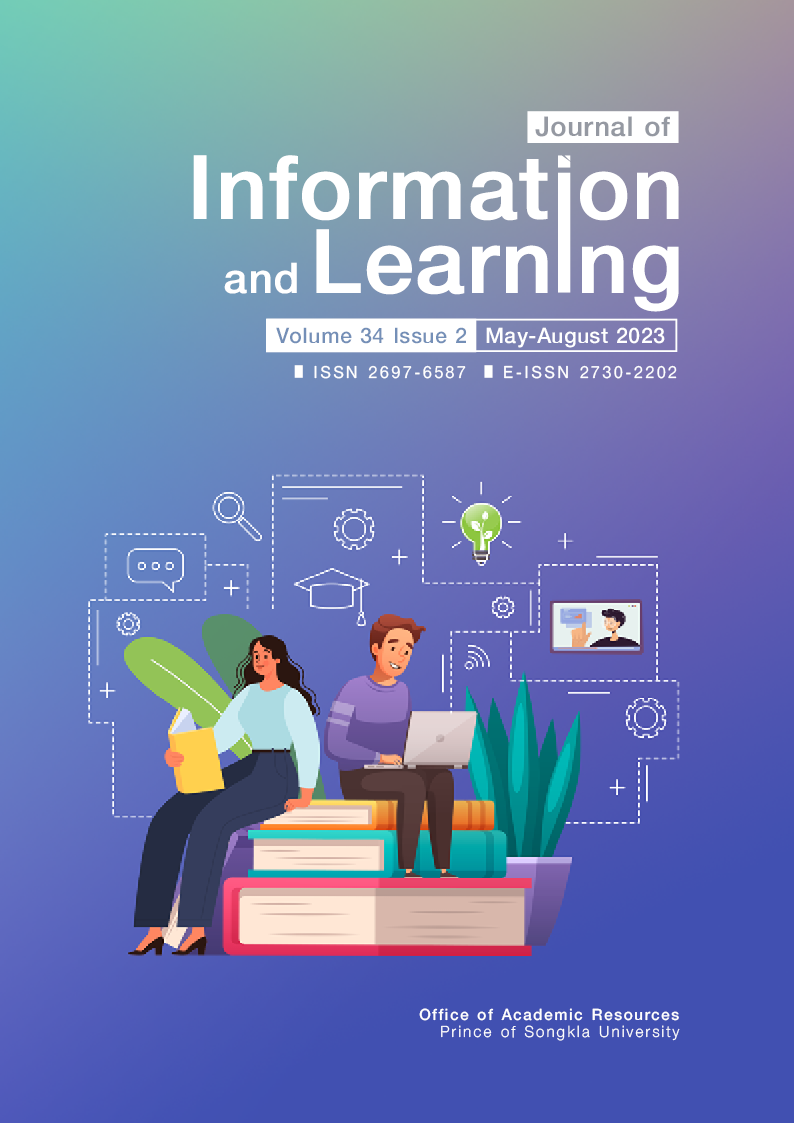The Development of Microlearning Inquiry Questions on the Topic of Ecosystem to Enhance Science Concepts for Ninth Grade Students
Main Article Content
Abstract
The purposes of this study were 1) to create and determine the effectiveness of microlearning inquiry questions on the topic of ecosystem to enhance science concepts for the ninth grade students according to the criteria of 75/75, 2) to compare the science concepts of the students before and after learning with the proposed learning method, and 3) to study the satisfaction of students with the proposed learning method. The study was conducted in accordance with the research and development processes. The sample group consisted of 39 ninth grade students in the semester 2 of academic year 2021 at Phitsanulok Pittayakom school. The sample group of students was selected by cluster random sampling. Research tools were microlearning inquiry questions on the topic of ecosystem, a science concepts test, and a satisfaction questionnaire. The statistics used for data analysis were mean, standard deviation and dependent sample t-test.
The research results showed that microlearning inquiry questions on the topic of ecosystem effectively enhance science concepts for the ninth grade students, with an efficiency of 76.13/77.44, which meets the specified criteria. It was also found that the students have higher science concepts after learning with the proposed learning method, at a level of significance of .05. The overall satisfaction of students after learning with microlearning inquiry questions on the topic of ecosystems is high.
Article Details

This work is licensed under a Creative Commons Attribution-NonCommercial-NoDerivatives 4.0 International License.
The Journal of Information and Learning is operated by the Office of Academic Resources, Prince of Songkla University. All articles published in the journal are protected by Thailand copyright law. This copyright covers the exclusive rights to share, reproduce and distribute the article, including in electronic forms, reprints, translations, photographic reproductions, or similar. Authors own copyrights in the works they have created as well as the Office of Academic Resources. The Journal reserves the right to edit the language of papers accepted for publication for clarity and correctness, as well as to make formal changes to ensure compliance with the journal's guidelines. All authors must take public responsibility for the content of their paper.
References
Boonmapan, S., Insaard, S., & Ingart, S. (2021). The development of microlearning lessons on social networks based on the constructivist approach to promote the analytical thinking of matthayomsueksa 6 students. Education and Communication Technology (ECT Journal), 16(21), 65-78.
Insaard, S. (2018). Kānʻō̜kbǣp botrīan ʻīlœ̄nning phư̄a phatthanā thaksa kān khit khan sūng [Designing e-learning lessons to develop higher-order thinking skills]. SE-EDucation.
Juykrayang, S., Chaturanon, W., & Thongsorn, P. (2018). The development of instructional model to enhance both science concepts and critical thinking skills of grade seventh students. Journal of Education and Social Development, 14(1), 286-298.
Kachensuwan, C. (2020). The learning achievement development on genetic using microlearning for grade 9 students. Research and Development Journal Suan Sunandha Rajabhat University, 12(2), 137-147.
Kao, R. M. (2019). Tips on constructing inclusive and equitable guided microlearning inquiry questions to clarify topics in general biology. Heritage University. https://www.researchgate.net/publication/338023858
Kiatcharungphan, S., Phibanchon, S., & Singlop, S. (2016). A study of science concepts and science learning achievement of twelfth grade students on biodiversity by using active learning. KKU Journal of Education Graduate Studies Research, 11(2), 224-234.
Ministry of Education. (2008). Laksūt kǣn klāng khan phư̄nthān Phutthasakkarāt sō̜ngphanhārō̜ihāsipʻet [Basic Education Core Curriculum B.E. 2551 (A.D. 2008)]. Agricultural Cooperative of Thailand Printing House.
Ministry of Education. (2017). Tūa chī wat læ sāra kānrīanrū kǣn klāngsāra kānrīanrū witthayāsāt (chabap prapprung Phō̜.Sō̜. sō̜ngphanhārō̜ihoksip) tām laksūt kǣn klāng kānsưksā naphư̄n thān Phutthasakkarāt sō̜ngphanhārō̜ihāsipʻet [Indicator and core learning content of science learning area (revise edition b.e.2560) accorging to basic education core curriculum b.e.2551]. Agricultural Cooperative of Thailand Printing House.
Mohammed, G. S., Wakil, K., & Nawroly, S. S. (2018). The effectiveness of microlearning to improve students’ learning ability. International Journal of Educational Research Review, 3(3), 32-38. https://www.researchgate.net/publication/324552176
Phonyiam, C., & Onyon, N. (2022). A study of scientific concept and scientific problem-solving ability of matayomsuksa 3 students by using discovery learning method through higher-order questioning. Journal of Graduate Studies Valaya Alongkorn Rajabhat University, 16(1), 15-31.
Sonnarai, S. (2002). A study of science concept forming and attitude toward science of mathayomsuksa 1 students in opec’s school in the basic education expansion project in the Chachoengsao provincial primary education office [Master's thesis, King Mongkut’s Institute of Technology Ladkrabang]. KMITL Central Library. https://opac.lib.kmitl.ac.th/catalog/BibItem.aspx?BibID=b00163029
Susaorat, P. (2008). Kānphatthanā kān khit [The Development of Thinking]. 9119 Technic Printing.
The Institute for the Promotion of Teaching Science and Technology (IPST). (2021). Phon kānpramœ̄n PISA sō̜ngphanhārō̜isipʻet kān ʻān khanitsāt læ witthayāsāt [PISA 2018 Results Reading Mathematics and Science]. IPST.
Yu, T. (2019). Yuk patiwat ʻutsāhakam khrang thī sī mư̄a hunyon khrō̜nglōk kānsưksā khư̄ thāng rō̜t dīeo khō̜ng manut [Education is hope in the era of the fourth industrial revolution]. SE-EDucation.


